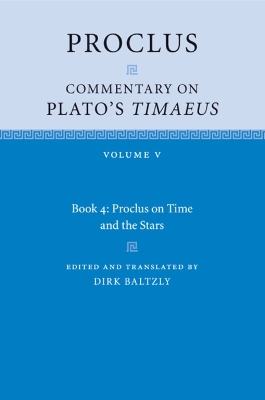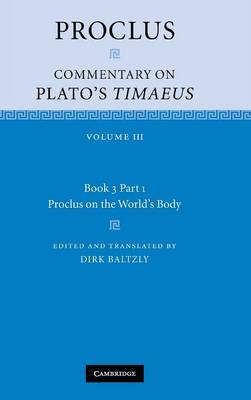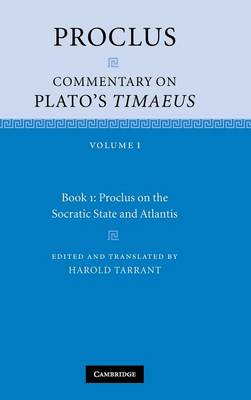Proclus: Commentary on Plato's Timaeus
5 total works
Proclus' commentary on Plato's dialogue Timaeus is arguably the most important commentary on a text of Plato, offering unparalleled insights into eight centuries of Platonic interpretation. It has had an enormous influence on subsequent Plato scholarship. This edition offers the first new English translation of the work for nearly two centuries, building on significant recent advances in scholarship on Neoplatonic commentators. It provides an invaluable record of early interpretations of Plato's dialogue, while also presenting Proclus' own views on the meaning and significance of Platonic philosophy. The present volume, the fifth in the edition, presents Proclus' commentary on the Timaeus, dealing with Proclus' account of static and flowing time; we see Proclus situating Plato's account of the motions of the stars and planets in relation to the astronomical theories of his day. The volume includes a substantial introduction, as well as notes that will shed new light on the text.
Volume 6, Book 5: Proclus on the Gods of Generation and the Creation of Humans
by Proclus
Published 3 April 2017
Proclus' commentary on the dialogue Timaeus by Plato (d.347 BC), written in the fifth century AD, is arguably the most important commentary on a text of Plato, offering unparalleled insights into eight centuries of Platonic interpretation. It has had an enormous influence on subsequent Plato scholarship. This edition nevertheless offers the first new translation of the work for nearly two centuries, building on significant recent advances in scholarship by Neoplatonic commentators. It will provide an invaluable record of early interpretations of Plato's dialogue, while also presenting Proclus' own views on the meaning and significance of Platonic philosophy. The book presents Proclus' unrepentant account of a multitude of divinities involved with the creation of mortal life, the supreme creator's delegation to them of the creation of human life, and the manner in which they took the immortal life principle from him and wove it together with our mortal parts to produce human beings.
In the present volume Proclus describes the 'creation' of the soul that animates the entire universe. This is not a literal creation, for Proclus argues that Plato means only to convey the eternal dependence of the World Soul upon higher causes. In his exegesis of Plato's text, Proclus addresses a range of issues in Pythagorean harmonic theory, as well as questions about the way in which the World Soul knows both forms and the visible reality that comprises its body. This part of Proclus' Commentary is particularly responsive to the interpretive tradition that precedes it. As a result, this volume is especially significant for the study of the Platonic tradition from the earliest commentators onwards.
Proclus' Commentary on Plato's dialogue Timaeus is arguably the most important commentary on a text of Plato, offering unparalleled insights into eight centuries of Platonic interpretation. This edition offered the first new English translation of the work for nearly two centuries, building on significant advances in scholarship on Neoplatonic commentators. It provides an invaluable record of early interpretations of Plato's dialogue, while also presenting Proclus' own views on the meaning and significance of Platonic philosophy. The present volume, the third in the edition, offers a substantial introduction and notes designed to help readers unfamiliar with this author. It presents Proclus' version of Plato's account of the elements and the mathematical proportions which bind together the body of the world.
Proclus' Commentary on Plato's dialogue Timaeus is arguably the most important commentary on a text of Plato, offering unparalleled insights into eight centuries of Platonic interpretation. This edition offers the first new English translation of the work for nearly two centuries, building on significant recent advances in scholarship on Neoplatonic commentators. It provides an invaluable record of early interpretations of Plato's dialogue, while also presenting Proclus' own views on the meaning and significance of Platonic philosophy. The present volume, the first in the edition, deals with what may be seen as the prefatory material of the Timaeus. In it Socrates gives a summary of the political arrangements favoured in the Republic, and Critias tells the story of how news of the defeat of Atlantis by ancient Athens had been brought back to Greece from Egypt by the poet and politician Solon.



